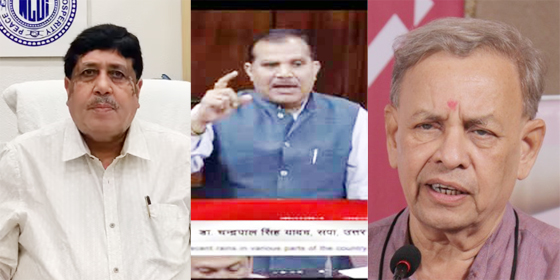Leading co-operators of the country were saddened as the news of the Supreme Court striking down the 97th Constitution Amendment Act came on Tuesday. The apex court of the land agreed with the judgment of the Gujarat High Court and upheld the striking down of Part IXB, which dealt with co-op societies.
“What to say? I am obviously unhappy”, said Dileep Sanghani NCUI President when Indian Cooperative wanted to know his reaction. In the course of the chat, however, Sanghani warmed up and said Modijee will certainly do something.
The basis of Sanghani’s hope was from the fact that Modi was the CM of Gujarat when in 2011 this amendment was passed by the Parliament and he along with Sanghani, as his Minister lost no time in aligning Gujarat Co-op Acts on the lines of the 97th CAA.
“Modi is now Prime Minister and if he was quick to act then as the CM, there is no reason he would not find some remedy now as the PM”, added Sanghani.
Elaborating further Sanghani said the appointment of Amit Shah as the Cooperation Minister is due to an understanding in the minds of the Prime Minister that co-operative could be a tool of change for rural as well as urban areas.
Shah would be able to achieve a lot with the strength of the co-op amendment as suggested in the 97th CAA, felt Sanghani. He said that an uniformity of co-op acts across states would ensure transparency and fair play and would come in handy for the dynamic Union Cooperative Minister.
There are two ways left before the union now-file a review petition or pass the amendment afresh as desired by the Supreme Court. I am sure the govt will take a call sooner than later, underlined Sanghani.
Chandrapal Singh Yadav the former President of NCUI who fought for the 9th CAA in Parliament as the RS MP, said “it is obvious that the amendment had some shortcomings and we as co-operators would request the govt to rectify them and reintroduce the act in the Parliament.
Hailing the Act, Chandra Pal recalled how India’s co-op profile rose globally when this act made forming co-op as a fundamental right in 2011.
Reacting to the SC verdict Satish Marathe, one of the founding members of Sahakar Bharati expressed relief that Citizen’s Fundamental Right to Form a Co-operative remains intact. Similarly, Article 43B of Directive Principles of State Policy remains intact. But Marathe blamed the undue haste shown by UPA in passing the 97th CAA which has led the Act to this pass.
“In the wake of the Anna Hajare agitation, UPA had introduced a half-baked 97th Constitution Amendment and had got it approved at midnight”, he said.
It bears recalling that the three-judge bench comprising Justices Rohinton Nariman, KM Joseph and BR Gavai dismissed the appeals filed by the Union of India against the judgment of the Gujarat High Court. Justices Nariman and Gavai struck down only Part IXB of the amendment, while Justice Joseph wrote a dissenting judgment striking down the entire constitutional amendment.
Constitutional (97th Amendment) Act, 2011, passed in parliament received the assent of the President on 12.01.2012, notified in the Gazette of India on 13.01.2012 and came into force on 15.02.2012. Later, the Gujarat HC questioned the validity of the 97th constitutional amendment.














































